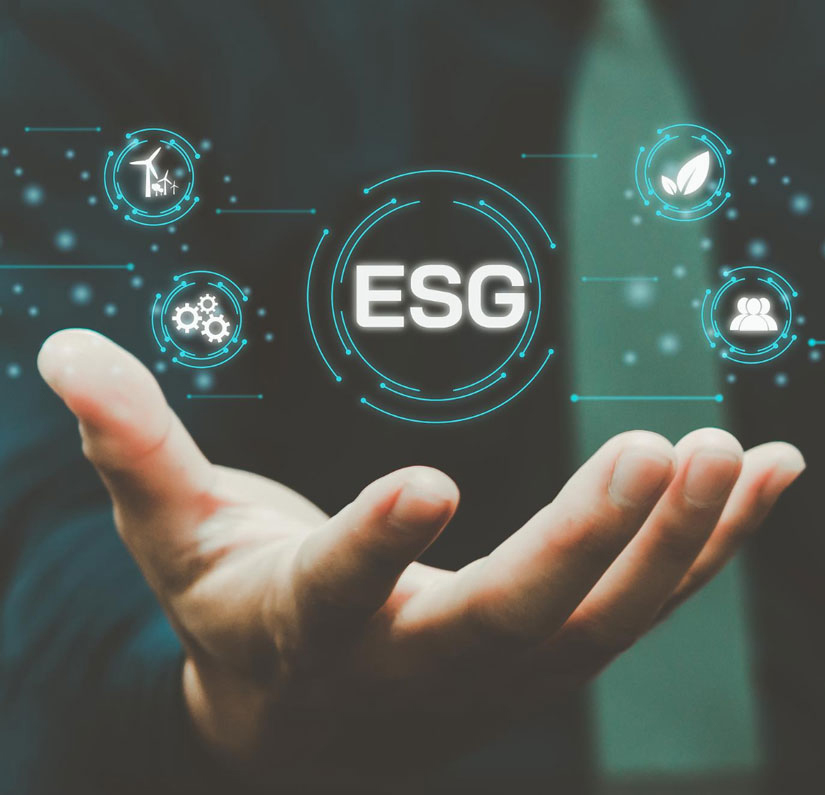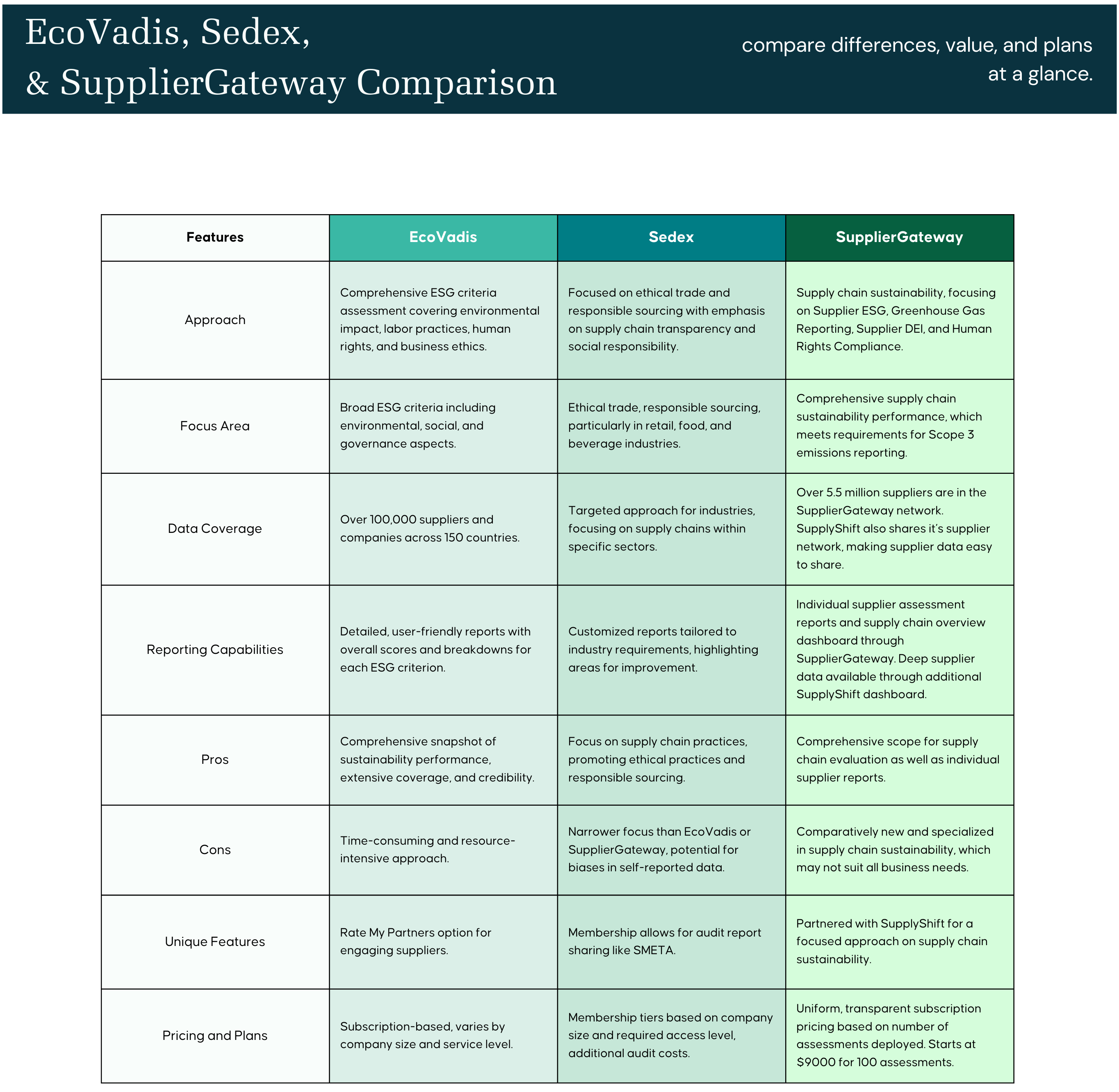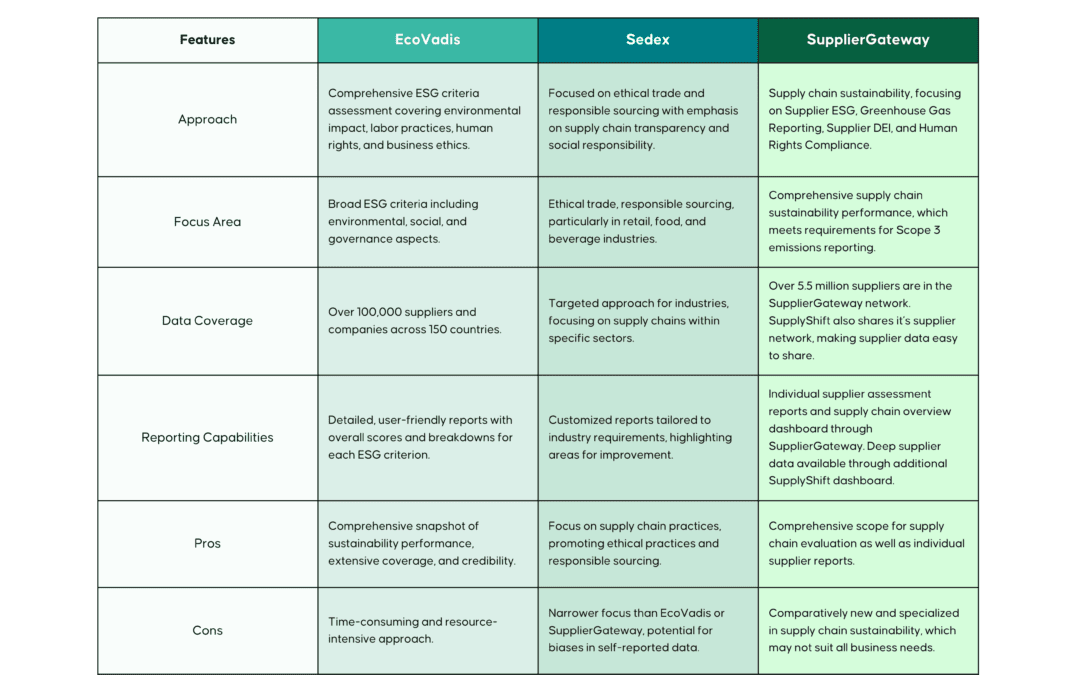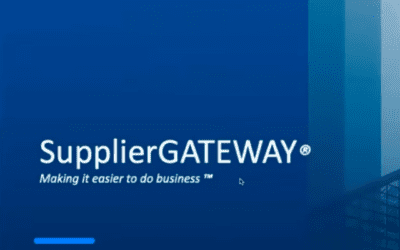EcoVadis vs. Sedex
Sustainability is a key concern for businesses of all sizes, and choosing the right sustainability assessment provider is essential for effective environmental, social, and governance (ESG) management. EcoVadis and Sedex are the most widely recognized providers, but how do you know which is right for your business?
In this blog post, we will compare EcoVadis and Sedex side-by-side, highlighting their strengths and weaknesses. We will also discuss pricing, plans, and how SupplierGateway’s Sustainability Assessments and Reporting compare to these industry leaders. By the end of this post, you can decide which sustainability assessment provider is best for your business.

EcoVadis vs. Sedex: which is the better choice for your business?
In today’s business landscape, sustainability is no longer an option but a necessity. With increasing pressure from consumers, investors, and regulators, companies must prioritize sustainability to remain competitive. Choosing the right sustainability assessment provider is crucial to managing ESG criteria effectively. EcoVadis and Sedex are two of the most recognized sustainability assessment providers, each with unique strengths and approaches.
When selecting between EcoVadis and Sedex, it’s essential to consider your business’s specific needs and priorities. Your industry, organization size, and sustainability goals should guide your decision. EcoVadis offers a comprehensive assessment that covers a wide range of ESG criteria, including environmental impact, labor practices, human rights, and business ethics. Sedex, on the other hand, specializes in ethical trade and responsible sourcing, focusing on supply chain transparency and social responsibility. Depending on your business’s focus and priorities, one provider may align better with your sustainability objectives.
Beyond the scope of the assessment, it’s essential to evaluate each provider’s approach. EcoVadis follows a risk-based approach, assigning higher weightings to criteria based on their potential impact on sustainability performance. Sedex, however, adopts a more balanced approach, giving equal weight to all criteria. Understanding the methodology and how it aligns with your organization’s sustainability practices and reporting requirements is crucial for selecting the most suitable provider.

EcoVadis vs. Sedex: a side-by-side comparison
EcoVadis and Sedex are prominent players in sustainability assessments, each offering unique strengths and catering to distinct business needs. While both platforms share the commendable goal of promoting responsible practices, they diverge in focus, data coverage, and reporting capabilities.
EcoVadis takes a holistic approach. They employ a wide range of ESG criteria to evaluate companies’ sustainability performance. This comprehensive assessment encompasses environmental impact, labor practices, human rights, and business ethics. By incorporating such a broad spectrum of criteria, EcoVadis empowers organizations to understand their ESG standing comprehensively.
On the other hand, Sedex specializes in ethical trade and responsible sourcing, emphasizing supply chain transparency and social responsibility. Their assessments primarily target industries like retail, food, and beverage, where these aspects hold paramount importance. By delving deep into supply chain practices, Sedex enables businesses to ensure that their operations align with ethical and sustainable principles.
Regarding data coverage, EcoVadis boasts an impressive database of over 100,000 suppliers and companies across 150 countries. This vast repository of information facilitates comprehensive assessments and allows businesses to benchmark their performance against industry peers. Sedex, while having a substantial database, focuses more narrowly on supply chains within specific sectors. This targeted approach ensures that Sedex’s assessments are tailored to each industry’s unique challenges and opportunities.
Regarding reporting, EcoVadis provides detailed and user-friendly reports that offer valuable insights into a company’s sustainability performance. These reports present an overall score and specific breakdowns for each ESG criterion. This comprehensive approach enables organizations to identify areas of strength and improvement, guiding their sustainability strategies. Sedex, on the other hand, delivers customized reports that can be tailored to address specific industry requirements. These reports highlight critical areas for improvement and provide recommendations for enhancing responsible sourcing practices, catering to the unique needs of each business.
Ultimately, the choice between EcoVadis and Sedex hinges on an organization’s specific priorities and requirements. Companies seeking a comprehensive assessment of their overall ESG performance may find EcoVadis the ideal solution. Conversely, businesses prioritizing ethical trade and responsible sourcing within specific industries may benefit from Sedex’s expertise. Both platforms offer valuable tools and insights that can drive positive change throughout an organization and its supply chains.

EcoVadis vs. Sedex: pros and cons
EcoVadis and Sedex offer distinct approaches to evaluating companies’ ESG performance. While both platforms provide valuable insights, understanding their pros and cons is crucial for organizations seeking the right fit for their sustainability journey.
EcoVadis adopts a comprehensive approach, assessing companies across various ESG criteria. This holistic evaluation provides a comprehensive snapshot of a company’s sustainability performance. With over 100,000 suppliers and companies across 150 countries in its database, EcoVadis boasts extensive coverage and credibility. However, this comprehensive approach can be time-consuming and resource-intensive, which can overwhelm organizations that lack the sustainability expertise to understand and utilize massive amounts of data.
In contrast, Sedex specializes in ethical trade and responsible sourcing, offering a more focused assessment tailored to specific industries and sectors. This targeted approach helps organizations address sustainability issues relevant to their supply chains, promoting ethical practices and responsible sourcing. However, Sedex’s narrower focus does not provide a comprehensive sustainability assessment like EcoVadis. Additionally, its reliance on self-reported data introduces potential biases or inaccuracies.
Ultimately, the choice between EcoVadis and Sedex depends on an organization’s specific needs and priorities. EcoVadis excels in providing a comprehensive ESG assessment, while Sedex specializes in ethical trade and responsible sourcing. Understanding each platform’s unique strengths and limitations is essential for selecting the most suitable partner to drive sustainable practices and enhance an organization’s sustainability performance.

EcoVadis vs. Sedex: pricing and plans
The cost of using EcoVadis and Sedex services varies based on several factors. The size of your company, the depth of the assessment or audit required, and the level of membership or services you choose all affect the total cost of the assessments.
Here’s a general overview of the cost structures for EcoVadis and Sedex. Specific prices can vary; for the most accurate and current information, you should confirm directly with each organization.
EcoVadis operates on a subscription basis. Companies pay an annual fee to access the platform, undergo assessments, and receive sustainability scorecards. The cost can vary significantly based on the company’s size (measured by annual revenue or number of employees) and the level of service chosen. Generally, the pricing can range from a few thousand dollars for small to medium-sized enterprises (SMEs) to tens of thousands for large corporations requiring more extensive assessments and features.
Basic Subscription: The basic level might include a standard assessment and a single scorecard for smaller companies.
Premium Services: Larger organizations might opt for premium services, which can include more detailed assessments, benchmarking reports, action plans for improvement, and increased visibility to potential clients on the EcoVadis network.
EcoVadis also offers a Rate My Partners option for enterprises looking to engage suppliers. You must request a quote from EcoVadis to receive pricing on these options.
Sedex’s pricing model is based on membership tiers, which determine access to their platform and tools. These tiers include the Self-Assessment Questionnaire (SAQ) and the ability to share and manage audit reports like the Sedex Members Ethical Trade Audit (SMETA). The cost for a Sedex membership is typically lower than that for an EcoVadis subscription, reflecting the different services provided:
Membership Fees: Membership fees for Sedex can range from a few hundred to a few thousand dollars annually, depending on the tier and size of the company. This fee allows access to the Sedex platform and varies based on the company’s annual turnover and the level of access required.
Audit Costs: The cost of conducting SMETA audits, separate from the membership fee, can vary based on the audit scope, location, and selected auditing body. Depending on these factors, audits might range from a few thousand dollars to more.
Key Cost Considerations
EcoVadis provides a comprehensive sustainability assessment service, including a detailed scorecard and benchmarks. The cost reflects the depth of analysis, the global benchmarking capabilities, and the action plans provided.
Sedex focuses more on ethical trade practices and offers a platform for sharing compliance data. While membership fees are generally lower, companies must consider the additional costs of audits conducted through Sedex’s platform.
When choosing between EcoVadis and Sedex, companies should consider the following:
- Initial costs
- The value each service can bring in terms of improving sustainability practices
- What is necessary to meet customer requirements
- How each can enhance brand reputation.
EcoVadis’s comprehensive assessment and benchmarking might justify the higher cost for some companies. In contrast, others may find Sedex’s focus on ethical trade and audit-sharing capabilities more aligned with their needs and a more cost-effective solution.
How SupplierGateway’s Sustainability Assessments and Reporting compare to EcoVadis and Sedex
SupplierGateway’s Sustainability Assessments and Reporting, in partnership with SupplyShift, a Sphera Company, offers a unique and advantageous approach to supply chain sustainability assessment compared to EcoVadis and Sedex. While EcoVadis and Sedex focus on assessing individual businesses’ sustainability performance, SupplierGateway’s assessments are specifically designed to evaluate the sustainability of your organization’s supply chain. This distinction provides a crucial perspective for organizations seeking to ensure responsible and sustainable practices throughout their entire network of suppliers.
SupplierGateway’s assessments stand out for their affordability, user-friendly design, and comprehensive scope. The platform offers tiered pricing plans starting at a highly competitive rate, making it accessible to businesses of all sizes. The intuitive and straightforward user interface enables efficient and hassle-free data collection and reporting. SupplierGateway’s assessments cover a wide range of sustainability criteria that help ensure a thorough evaluation of your supply chain’s sustainability performance.
Take a self-guided tour of SupplierGateway’s Sustainability Assessments and Reporting.
Compared to EcoVadis and Sedex, SupplierGateway offers a more streamlined and comprehensive supply chain sustainability assessment approach. By focusing specifically on supply chain sustainability, SupplierGateway provides organizations with the tools and insights to drive positive change throughout their entire network of suppliers. The platform’s affordability, user-friendly design, and comprehensive scope make it an ideal choice for businesses committed to responsible and sustainable supply chain management.

Which is best for your business, EcoVadis, Sedex, or SupplierGateway?
When considering EcoVadis vs. Sedex, you may find that other options like SupplierGateway’s Sustainability Assessments and Reporting may fit your business needs better. This section will discuss the factors you should consider when choosing a sustainability assessment platform for your business. These factors include:
- The size and industry of your business
- Your sustainability goals and priorities
- The cost and resources required for each platform
- The level of support and guidance you need.
The first step in choosing a sustainability assessment platform is to assess your business needs and priorities. Consider the size of your business, industry, and sustainability goals. For example, if you are a small business in the food and beverage industry, you may want to focus on assessments that address food safety and ethical sourcing. If you are a large multinational corporation, you may need a more comprehensive assessment that covers a wide range of ESG criteria.
Once you understand your needs well, you can compare the different sustainability assessment platforms. Consider the cost of each platform, the resources required to implement and maintain it, and the level of support and guidance you will receive from the provider.
If you’re looking for the easiest and fastest way to collect sustainability and ESG data from your suppliers, SupplierGateway’s Sustainability Assessments and Reporting. With a specialization in collecting and assessing supplier ESG data with the help of SupplyShift, SupplierGateway’s assessments provide both at-a-glance supply chain sustainability information as well as in-depth reporting on individual suppliers.
Want to learn more about the platform? Take a quick self-guided walkthrough.













